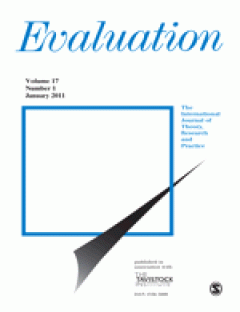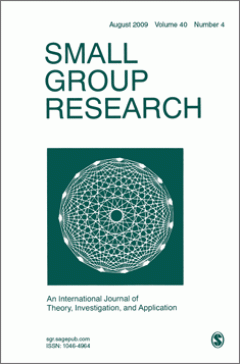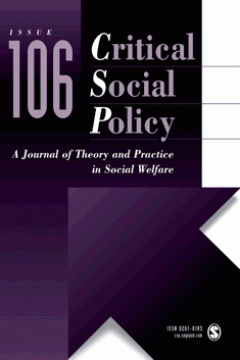Filter by

A realistic evaluation of fines for hospital discharges : Incorporating the h…
Programmes and policies transform over time and locations. Evaluation projects can apprehend only temporal and contextualized sections of the social world. This article uses a realist evaluation of financial incentives in English hospital discharge policy to illustrate how previous evaluations of the same programme theory were inspected for evidence to construct context, mechanisms and outcomes…
- Edition
- Vol. 17 no. 1, January 2011.pp.21-36
- ISBN/ISSN
- 13563890
- Collation
- -
- Series Title
- Evaluation
- Call Number
- -

Strengthening evaluation through interactive problem structuring: A case stud…
The quality of an evaluation largely depends on the quality of the underlying problem definition and the quality of the problem definition often improves as stakeholder involvement increases. By means of a study on the management of attempted suicides by drug overdose, we explored whether an interactive methodology could be adequate for problem structuring. Despite the fact that a high level of…
- Edition
- Vol. 17 no. 1, January 2011.pp. 37-52
- ISBN/ISSN
- 13563890
- Collation
- -
- Series Title
- Evaluation
- Call Number
- -

When Good Teammates Are Bad : Physiological Threat on Recently Formed Teams
This research examined the ways in which superior teammate performance in recently formed teams affects an individual�s motivation. It was hypothesized that members of recently formed teams for whom social identity was not yet salient would experience threat, a maladaptive physiological pattern that indicates low perceptions of coping resources relative to situational demands. Furthermore, it w…
- Edition
- Vol. 42 no. 1, February 2011.pp. 3-31
- ISBN/ISSN
- 10464964
- Collation
- -
- Series Title
- Small Group Research
- Call Number
- -

Two-Dimensional Structure of Team Process Improvement : Team Reflection and T…
Work group literature has recently focused on team process improvement, which refers to a learning process within the team, including the review of recent work methods and objectives and the development of alternative working strategies. Until now, however, no systematic empirical effort has been undertaken to empirically explore the dimensionality of team process improvement, although a dual f…
- Edition
- Vol. 42 no. 1, February 2011.pp.32-54
- ISBN/ISSN
- 10464964
- Collation
- -
- Series Title
- Small Group Research
- Call Number
- -

Members’ Openness to Experience and Teams’ Creative Performance
Team composition based on personality has been found to have important effects on team outcomes. However, little is still known about the effect of team personality composition on team creativity. To this end, this study examined the relationship of team members� openness to experience and team creativity. Results from a study with 31 graduate student teams suggest that openness to experience i…
- Edition
- Vol. 42 no. 1, February 2011.pp. 55-76
- ISBN/ISSN
- 10464964
- Collation
- -
- Series Title
- Small Group Research
- Call Number
- -

Managers’ Trait Emotional Intelligence and Group Outcomes : The Case of Gro…
The purpose of this study is to extend the emerging literature on the effects of managers� emotional skills on group outcomes. Specifically, the authors propose and test a theoretical model that examines impact of managers� trait emotional intelligence (EI) on group job satisfaction. Data are based on middle managers and their immediate team members from public service organizations. Results, u…
- Edition
- Vol. 42 no. 1, February 2011.pp. 77-102
- ISBN/ISSN
- 10464964
- Collation
- -
- Series Title
- Small Group Research
- Call Number
- -

Considering Leadership Climate Strength : Affective Commitment Within Superma…
Using data from 5,695 employees in 345 supermarkets in Czech Republic, Poland, and Slovakia, the authors examined whether leadership climate strength (LCS), defined as the shared perceptions of employees concerning their supervisors, is related to employees� affective commitment (AC) to the supermarket and to colleagues. In addition, the authors examined if LCS moderates the relationship betwee…
- Edition
- Vol. 42 no. 1, February 2011.pp.103-123
- ISBN/ISSN
- 10464964
- Collation
- -
- Series Title
- Small Group Research
- Call Number
- -

‘Conduct of conduct’ or the shaping of ‘adequate dispositions’? Labou…
In this paper, we provide an analysis of the deployment of labour market and career guidance as an instrument of liberal governmental rationality, and hence as a key tool for shaping attitudes suitable for the labour market. We characterize such processes and their effects on both those in receipt of guidance and those delivering it, on the basis of a three-year study in France, Slovenia, Spain…
- Edition
- Vol. 31 no. 1, February 2011.pp. 77-101
- ISBN/ISSN
- 02610183
- Collation
- -
- Series Title
- Critical Social Policy
- Call Number
- -

Constructing Interethnic Conflict and Cooperation : Why Some People Harmed Je…
The authors draw on a natural experiment to demonstrate that states can reconstruct conflictual interethnic relationships into cooperative relationships in relatively short periods of time. The article examines differences in how the gentile population in each of two neighboring territories in Romania treated its Jewish population during the Holocaust. These territories had been part of tsarist…
- Edition
- Volume 63, Issue 01, January 2011. pp 1 -42
- ISBN/ISSN
- 00438871
- Collation
- -
- Series Title
- World Politics
- Call Number
- -

Anti-social behaviour orders and young people with learning disabilities
This paper sets out to critically explore the use of anti-social behaviour orders (ASBOs) in relation to young people with learning disabilities. It brings together an emerging body of evidence, from a range of sources, which suggests that these marginalized and vulnerable young people are over-represented amongst those made subject to ASBOs. In this context it will provide a critique of existi…
- Edition
- Vol. 31 no. 1, February 2011.pp. 102-125
- ISBN/ISSN
- 02610183
- Collation
- -
- Series Title
- Critical Social Policy
- Call Number
- -

‘Social inclusion’ through sports-based interventions?
There is international enthusiasm for the idea that sport can contribute to �social inclusion� strategies. Sport now features in various targeted youth initiatives, including �Positive Futures�: a �sport and activity based social inclusion programme� currently operating in England and Wales. The processes through which these �sports-based interventions� might promote �social inclusion� require,…
- Edition
- Vol. 31 no. 1, February 2011.pp. 126-150
- ISBN/ISSN
- 02610183
- Collation
- -
- Series Title
- Critical Social Policy
- Call Number
- -

Strategic Corporate Social Responsibility and Environmental Sustainability
The authors review three theoretical approaches to strategic corporate social responsibility (CSR), which can be defined as voluntary CSR actions that enhance a firm�s competitiveness and reputation. The end result of such activities should be an improvement in financial and economic performance. Based on an overview of recent empirical evidence, the authors conclude that economic theories of s…
- Edition
- Vol. 50 no. 1, March 2011.pp. 6-27
- ISBN/ISSN
- 00076503
- Collation
- -
- Series Title
- Business & Society
- Call Number
- -

Conditions for Value Creation in the Marketplace Through the Management of CS…
This article contributes to research on strategic corporate social responsibility (CSR) by detailing the condition-sets governing the emergence of market-led demand for CSR. We build on external effects theory to evaluate the strategic options a company can adopt to manage its negative external effects in a way that creates social and economic value. We draw on the economic concepts of rivalry …
- Edition
- Vol. 50 no. 1, March 2011.pp. 28-49
- ISBN/ISSN
- 00076503
- Collation
- -
- Series Title
- Business Society
- Call Number
- -

Organizational Commitment in Manufacturing Employees : Relationships With Cor…
Despite the numerous forays into understanding the concept and consequences of Corporate Social Performance (CSP), very little is known about how CSP impacts employees. In response, this study examines the relationship between employee perceptions of CSP and organizational commitment in a manufacturing industry setting. Survey data are collected from 136 production employees at three kitchen ca…
- Edition
- Vol. 50 no. 1, March 2011.pp. 50-70
- ISBN/ISSN
- 00076503
- Collation
- -
- Series Title
- Business Society
- Call Number
- -

Measuring Environmental Strategy : Construct Development, Reliability, and Va…
Inconsistent results in prior work that link environmental strategy to competitive advantage may be due to the empirical difficulties of marrying the theoretical connection between a firm�s resource base and its environmental strategy. The authors contribute to the field by developing a measure that is congruent with the natural resource�based view, a dominant paradigm in this line of work. Thi…
- Edition
- Vol. 50 no. 1, March 2011.pp. 71-115
- ISBN/ISSN
- 00076503
- Collation
- -
- Series Title
- Business Society
- Call Number
- -

Under the Tip of the Iceberg: Absorptive Capacity, Environmental Strategy, an…
Although existing research evaluates how the adoption of proactive environmental strategies affects corporate performance, there is little understanding of the organizational mechanisms that link such strategies to competitive advantage. It is, therefore, unclear how environmental strategies relate to other management strategies that could lead to a competitive advantage. In this article, we an…
- Edition
- Vol. 50 no. 1, March 2011.pp. 116-154
- ISBN/ISSN
- 00076503
- Collation
- -
- Series Title
- Business Society
- Call Number
- -

Domesticating Radical Rant and Rage : An Exploration of the Consequences of E…
This article examines the effect of social shareholder activism on one of the most visible aspects of corporate social behavior, namely corporate pollution management practice. Social shareholder activism is a distinct form of social movement that engages firms �in the suites.� We theorize the effect of social shareholder activism using three social movement mechanisms: (a) disruption of routin…
- Edition
- Vol. 50 no. 1, March 2011.pp. 155-188
- ISBN/ISSN
- 00076503
- Collation
- -
- Series Title
- Business Society
- Call Number
- -

Green Governance : Boards of Directors’ Composition and Environmental Corpo…
This study contributes to the work on board composition and firm corporate social responsibility by extending it to the environmental domain. It evaluates the relationship between boards of directors� composition and environmental corporate social responsibility (ECSR) by integrating literatures on board composition, firm corporate social responsibility, and individual differences in attitudes …
- Edition
- Vol. 50 no. 1, March 2011.pp. 189-223
- ISBN/ISSN
- 00076503
- Collation
- -
- Series Title
- Business Society
- Call Number
- -

Public Maternalism Goes to Market : Recruitment, Hiring, and Promotion in Pos…
Under what conditions do motherhood penalties emerge in countries undergoing transition from state socialism to capitalism? This analysis identifies the ways managers in global financial firms employ gendered assumptions in constructing and implementing labor practices among highly skilled professional workers in Hungary. Relying on 33 in-depth interviews with employers as well as interviews wi…
- Edition
- Vol. 25 no. 1, February 2011.pp. 5-26
- ISBN/ISSN
- 00438871
- Collation
- -
- Series Title
- Gender & Society
- Call Number
- -

Gender in Context, Content, and Approach : Comparing Gender Messages in Girl …
I explore gender messages in Boy Scout and Girl Scout handbooks through an analysis of how gender is infused in the context and content of Scout activities as well as in instructions about how the Scouts are to approach these activities. I find that girls are offered more activities intended to be performed in group contexts than are boys. Boys are offered proportionately more activities with s…
- Edition
- Vol. 25 no. 1, February 2011.pp. 27-47
- ISBN/ISSN
- 08912432
- Collation
- -
- Series Title
- Gender & Society
- Call Number
- -
 Computer Science, Information & General Works
Computer Science, Information & General Works  Philosophy & Psychology
Philosophy & Psychology  Religion
Religion  Social Sciences
Social Sciences  Language
Language  Pure Science
Pure Science  Applied Sciences
Applied Sciences  Art & Recreation
Art & Recreation  Literature
Literature  History & Geography
History & Geography